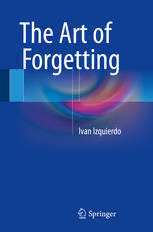
The Art of Forgetting PDF
Preview The Art of Forgetting
The Art of Forgetting Ivan Izquierdo 123 The Art of Forgetting Ivan Izquierdo The Art of Forgetting Ivan Izquierdo Memory Center Pontifi cal Catholic University of Rio Grande do Sul, and National Institute of Translation Neuroscience National Research Council Porto Alegre , Brazil ISBN 978-3-319-06715-5 ISBN 978-3-319-06716-2 (eBook) DOI 10.1007/978-3-319-06716-2 Library of Congress Control Number: 2015931258 Springer Cham Heidelberg New York Dordrecht London © Springer International Publishing Switzerland 2015 T his work is subject to copyright. All rights are reserved by the Publisher, whether the whole or part of the material is concerned, specifi cally the rights of translation, reprinting, reuse of illustrations, recitation, broadcasting, reproduction on microfi lms or in any other physical way, and transmission or information storage and retrieval, electronic adaptation, computer software, or by similar or dissimilar methodology now known or hereafter developed. T he use of general descriptive names, registered names, trademarks, service marks, etc. in this publication does not imply, even in the absence of a specifi c statement, that such names are exempt from the relevant protective laws and regulations and therefore free for general use. T he publisher, the authors and the editors are safe to assume that the advice and information in this book are believed to be true and accurate at the date of publication. Neither the publisher nor the authors or the editors give a warranty, express or implied, with respect to the material contained herein or for any errors or omissions that may have been made. Printed on acid-free paper S pringer International Publishing AG Switzerland is part of Springer Science+Business Media (www.springer.com) Foreword We all know a lot about forgetting because we do a lot of it. And, as Izquierdo dis- cusses and emphasizes throughout this little book, it is mostly good that we forget. After all, most of our experiences are, well, forgettable. We do not need to recall for our lifetimes, if at all, our uncountable daily experiences. But, we do need to main- tain memories of important experiences as well as the skills that help us to survive. Memory is, for all animals, critical for survival. If memory is so critical, however, why do we so readily forget most of our daily experiences? In an engaging style that mixes historical ideas with literary observations and experimental fi ndings, Izquierdo discusses what is known and what needs to be known about the battle between remembering and forgetting. The studies of Ebbinghaus, Pavlov and other pioneers of the late nineteenth century revealed much about the conditions of practice that infl uence learning and subsequent memory. Research mostly of the past half century provided a rich and detailed understanding of different forms of learning and memory. M ore recent studies of the past several decades, including those from Izquierdo’s laboratory, have revealed much about how the activity of neurons and brain systems enables us to learn and remember. Although less is known about why we forget, Izquierdo discusses much of what is known as well as why it is important to under- stand forgetting. As he notes, both incorrect remembering and failures to forget can form the bases of distressing clinical problems. Before proceeding to turn to the fi rst page of this book, the reader is advised to make sure that she/he has no other pressing obligations, as interesting ideas are found on every page. Izquierdo has written a highly engaging, thoughtful and infor- mative book. Much of it is likely to be unforgettable. Irvine , CA , USA James McGaugh Research Professor of Neurobiology and Behavior Center for the Neurobiology of Learning and Memory University of California Irvine v Preface T his is the English version of the second edition of a book published in Portuguese in 2011. Many changes were introduced here relative to that former version. I thank Drs. Jociane de Carvalho Myskiw and Cristiane Furini for their many valuable sug- gestions as well as the many readers of the former versions for their comments and support. The artwork of the book is by Dr. Myskiw and Ms. Maria Eduarda Izquierdo . Porto Alegre, Brazil Ivan Izquierdo vii Contents 1 Introduction ............................................................................................... 1 References ................................................................................................... 6 2 The Art of Forgetting ................................................................................ 7 2.1 The Formation and Retrieval of Memories ...................................... 7 2.2 Forms of Forgetting: First Steps of the Art (Extinction, Repression, and Discrimination) .................................. 11 2.3 Conditioned Refl exes........................................................................ 12 2.4 The Rapid Forgetting of Working Memory Is Intrinsic to Its Nature ...................................................................................... 14 2.5 Brain Areas and Systems Involved in the Different Types of Memory: Some Basic Notions of Neuronal Function ....... 17 2.6 Executive Functions ......................................................................... 21 2.7 More on the Connections Between Nerve Cells .............................. 23 2.8 The Forgetting of Short- and Long-Term Memory .......................... 24 2.9 Memory and Emotions ..................................................................... 25 2.10 More on Memory and Emotions: Endogenous State Dependency ..... 27 2.11 The Use and Disuse of Synapses ...................................................... 29 2.12 Failure of Memory Persistence as a Form of Forgetting? ................ 30 2.13 Reconsolidation ................................................................................ 32 2.14 Practicing Memory ........................................................................... 32 2.15 Reading, Knowledge, Physical Exercise, Social Life, Memory, and Illness ......................................................................... 36 2.16 The Art of Forgetting: A Second Approach ...................................... 38 2.17 Denial and Memory Falsifi cation ..................................................... 39 2.18 Forgetting by Large Populations ...................................................... 43 2.19 Surviving Through Neuronal Death ................................................. 44 2.20 The Famous Case of Patient H.M..................................................... 45 2.21 When Forgetting Is Not an Art: Amnesic Patients ........................... 47 2.22 Anterograde Amnesia by an Interference with Consolidation ......... 50 2.23 Neuronal Branching and the Suppression of Branching, Neurogenesis, and Neuronal Death as Adaptive Phenomena ........... 51 2.24 The Acquisition of New Memories .................................................. 52 2.25 Repression ........................................................................................ 54 ix
